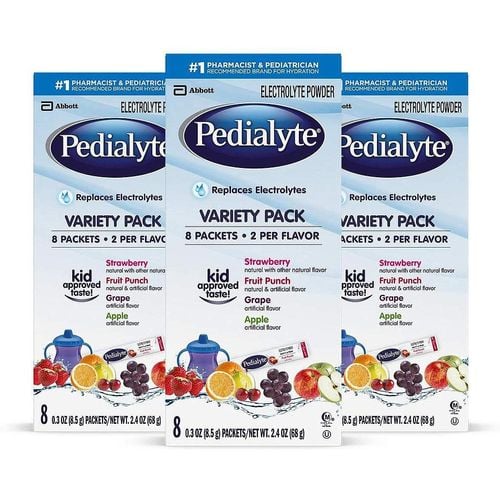This is an automatically translated article.
Throughout a child's development, it is important to ensure that they get the right amount of vitamins and minerals they need to ensure optimal health. Most children are able to get all the nutrients they need from a healthy diet, however, in some special cases, some children need vitamin and mineral supplements. reasonable.
1. Essential nutrients for young children
Children's nutritional needs depend on their age, sex, size, growth and activity level. According to health experts, children between the ages of 2 and 8 need between 1,000 and 1,400 calories per day. Children between the ages of 9 and 13 need 1,400 to 2,600 calories, which fluctuates based on a number of factors listed above.
In addition to eating enough calories, a child's diet should meet the following nutritional guidelines (DRIs) criteria:

Although the above nutrients are the most talked about vitamins and minerals in a child's diet, they are not the only nutrients needed by children.
2. Do children have different nutritional needs than adults?
Normally, children need the same nutrients as adults, but in lower amounts. In the early stages of life, iron, zinc, iodine, choline, vitamin A, vitamins B6, B12 and D are very important in the development of a baby's brain. As children grow older, the amount of vitamin D and calcium needed also increases to maintain bone health and ensure adequate development.
3. Do children need to use vitamin supplements?
Generally, children who have a healthy, balanced diet do not need vitamin supplements. However, many infants have special nutritional needs that require certain supplements, such as vitamin D, for breastfed babies.
Both the American Academy of Pediatrics and the United States Department of Agriculture recommend that children over 1 year of age with a healthy diet should not take vitamin and mineral supplements in excess of recommended DRI level. These organizations all provide information that encourages children to eat a variety of green vegetables, fruits, whole grains, milk and other healthy foods to fully absorb nutrients.
However, there are exceptions when children need vitamins and minerals from supplements.

Trẻ sơ sinh có nhu cầu vitamin D rất nhiều
4. Cases where children need to use vitamin supplements
There are some situations where a child may have a potential for vitamin and mineral deficiencies such as:
The child adheres to a vegetarian or vegan diet
The child has a medical condition that affects the absorption of nutrients, for example such as celiac disease, cancer, cystic fibrosis, or inflammatory bowel disease (IBD)
Children who have had surgery to affect the intestines or stomach
Children who are picky eaters and lazy to eat a wide variety of foods
Children who comply Vegetarian diets may be at risk for deficiencies in calcium, iron, zinc, vitamins B12 and D.
Vegetarian diets can be especially dangerous for children if certain foods are present. Nutrients like vitamin B12 - found in abundance in animal foods - cannot be replaced through other foods or supplements. Deficiencies of these minerals and vitamins from animals can cause growth retardation or abnormality in children.
However, children can adhere to a nutritious vegetarian diet if their parents incorporate a variety of food sources that are full of vitamins and minerals naturally or added to their diets.
In addition, children with conditions such as celiac disease or inflammatory bowel disease may have difficulty absorbing certain vitamins and minerals, especially iron, zinc, and vitamin D. Similarly, children with cystic fibrosis have difficulty absorbing fats and, as a result, may not be able to fully absorb the fat-soluble vitamins A, D, E, and K.

Một số trường hợp bé bị nhiễm bệnh nên rất khó hấp thụ sắt
A study in 937 children aged 3 to 7 found that picky eating was strongly associated with low iron and zinc levels. It is possible that prolonged picky eating leads to micronutrient deficiencies over time. Therefore, it is important to ensure that children can get enough of these nutrients from other sources.
5. How to choose vitamins and dosage
It is essential to consult with health and nutrition experts before giving children vitamin and mineral supplements. In particular, when choosing products, parents should look for quality brands that have been tested by third parties, such as NSF International, United States Pharmacopeia (USP), ConsumerLab.com, Informed-Choice or Control Group banned substance control (BSCG). Also choose vitamins that are made specifically for children and make sure they don't exceed your child's daily nutritional needs.
6. Ways to make sure children get enough nutrients
Vitamin or mineral supplements can have a negative impact on a child's health when taken in excess. This is especially true of the fat-soluble vitamins A, D, E, and vitamin K that are stored in body fat. One study reported vitamin D toxicity in a child who overdosed on the supplement.
Parents should be careful with vitamin-fortified gummy products, this product often attracts young children, which easily leads to children eating too much. Therefore, keeping these vitamin supplements out of the reach of young children and consulting a specialist about dosage is paramount.
Please dial HOTLINE for more information or register for an appointment HERE. Download MyVinmec app to make appointments faster and to manage your bookings easily.
Healthline.com Reference Article












